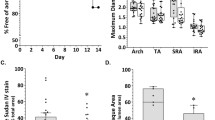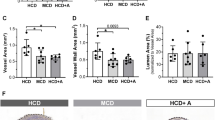Abstract
Lectin-like oxidized low-density lipoprotein (ox-LDL) receptor-1 (LOX-1) is a major receptor for ox-LDL in endothelial cells. Its activation regulates endothelial proliferation, differentiation, migration and apoptosis. Recent in vitro studies show that LOX-1 activation by ox-LDL and angiotensin II (Ang II) induces angiogenesis via activation of NADPH oxidase and subsequent increase in ROS production. In this study, we investigated the effect of LOX-1 gene deletion (LOX-1 knockout or KO mice) on angiogenesis in response to prolonged Ang II infusion in vivo. Our studies showed that Ang II (vs. saline) infusion enhanced capillary formation in subcutaneously injected Matrigel® plugs. Ang II infusion also resulted in marked angiogenesis in the hearts as determined by CD31 immunopositivity. There was an increased expression (RT-PCR and Western blotting) of CD31 and VEGF in the hearts of mice infused with Ang II, indicating pro-angiogenic miliue. More importantly, LOX-1 KO mice reveled markedly limited angiogenesis in the Matrigel® plugs as well as in the hearts despite similar infusion with Ang II (all P < 0.05 vs. wild-type mice). In addition, the hearts of LOX-1 KO mice had attenuated expression of pro-inflammatory and angiogenic signals MCP-1 and IL-1β following Ang II Infusion. Lastly, the rise in blood pressure in response to Ang II was less in the LOX-1 KO mice (P < 0.05 vs. wild-type mice). Our findings suggest that LOX-1 participates in angiogenesis in hypertension, which may be related to a state of inflammation.



Similar content being viewed by others
References
Jiang K, Yan M, Mehta JL, Hu C. Angiogenesis is a link between atherosclerosis and tumorigenesis: role of LOX-1. Cardiovasc Drugs Ther. 2011;25:461–8.
Zetter BR. Angiogenesis and tumor metastasis. Annu Rev Med. 1998;49:407–24.
Rosinberg A, Khan TA, Sellke FW, Laham RJ. Therapeutic angiogenesis for myocardial ischemia. Expert Rev Cardiovasc Ther. 2004;2:271–83.
Jesmin S, Hattori Y, Togashi H, Ueno K, Yoshioka M, Sakuma I. Age-related changes in cardiac expression of VEGF and its angiogenic receptor KDR in stroke-prone spontaneously hypertensive rats. Mol Cell Biochem. 2005;272:63–73.
Zarei M, Khazaei M, Sharifi MR, Pourshanazari AA. Coronary angiogenesis during experimental hypertension: is it reversible? J Res Med Sci. 16:269–75.
Munk VC, de Sanchez ML, Petrimpol M, Butz N, Banfi A, Eriksson U, et al. Angiotensin II induces angiogenesis in the hypoxic adult mouse heart in vitro through an AT2-B2 receptor pathway. Hypertes. 2007;49:1178–85.
Jesmin S, Hattori, Sakuma I, Mowa C, Kitabatake A. Role of ANG II in coronary capillary angiogenesis at the insulin-resistant stage of NIDDM rat modle. Am J Physiol Heart Circ Physiol. 2002;283:H1387–97.
Hu C, Dandapat A, Mehta JL. Angiotensin II induces capillary formation from endothelial cells via LOX-1 dependent redox-sensitive pathway. Hypertension. 2007;50:952–7.
Mitra S, Wang X, Khaidakov M, Ding Z, Ayyadevera S, Hearnsberger E, et al. Aspirin downregulates angiotensin type 1 receptor transcription. Implications in capillary formation from endothelial cells. J Cardiovasc Pharmacol. 2012;60:187–92.
Khaidakov M, Mitra S, Wang X, Ding Z, Bora N, Lyzogubov V, et al. Large impact of low concentration oxidized LDL on angiogenic potential of human endothelial cells: a microarray study. PLoS One. 2012;7:e47421.
Dandapat A, Hu C, Sun L, Mehta JL. Small concentrations of oxLDL induce capillary tube formation from endothelial cells via LOX-1-dependent redox-sensitive pathway. Arterioscler Thromb Vasc Biol. 2007;27:2435–42.
Lu J, Wang X, Wang W, Muniyappa H, Hu C, Mitra S, et al. LOX-1 abrogation reduces cardiac hypertrophy and collagen accumulation following chronic ischemia in the mouse. Gene Ther. 2012;19:522–31.
Hu C, Dandapat A, Chen J, Fujita Y, Inoue N, Kawase Y, et al. LOX-1 deletion alters signals of myocardial remodeling immediately after ischemia-reperfusion. Cardiovasc Res. 2007;76:292–302.
Wang X, Khaidakov M, Ding Z, Dai Y, Mercanti F, Mehta JL. LOX-1 in the maintenance of cytoskeleton and proliferation in senescent cardiac fibroblasts. J Mol Cell Cardiol. 2013;60:184–90.
Hu C, Dandapat A, Sun L, Marwali MR, Inoue M, Sugawara F, et al. Modulation of angiotensin II-mediated hypertension and cardiac remodeling by lectin-like oxidized low-density lipoprotein receptor-1 deletion. Hypertension. 2008;52:556–62.
Biswas S, Charlesworth PJ, Turner GD, Leek R, Thamboo PT, Campo L, et al. CD31 angiogenesis and combined expression of HIF-1α and HIF-2α are prognostic in primary clear-cell renal cell carcinoma (CC-RCC), but HIFα transcriptional products are not: implications for antiangiogenic trials and HIFα biomarker studies in primary CC-RCC. Carcinogenesis. 2012;33:1717–25.
Hoeben A, Landuyt B, Highley MS, Wildier H, Van Oosterom AT, De Bruijin EA. Vascular endothelial growth factor and angiogenesis. Pharmacol Rev. 2004;56:549–80.
Niu J, Azfer A, Zhelyabovska O, Fatma S, Kolattukudy PE. Monocyte chemotactic protein (MCP)-1 promotes angiogenesis via a novel transcription factor, MCP-1-induced protein 9MCMIP. J Biol Chem. 2008;283:14542–51.
Nakao S, Kuwano T, Tsutsumi-Miyahara C, Ueda S, Kimura YN, Hamano S, et al. Infiltration of COX-2-expressing macrophages is a prerequisite for IL-1 beta-induced neovascularization and tumor growth. J Clin Invest. 2005;115:2979–91.
Escoba E, Rodríquez-Reyna TS, Arrieta O, Sotelo J. Angiotensin II, cell proliferation and angiogenesis regulator: biologic and therapeutic implications in cancer. Curr Vasc Pharmacol. 2004;2:385–99.
Li DY, Zhang YC, Phillips MI, Sawamura T, Mehta JL. Upregulation of endothelial receptor for oxidized low-density lipoprotein (LOX-1) in cultured human coronary artery endothelial cells by angiotensin II type 1 receptor activation. Circ Res. 1999;84:1043–9.
Wang X, Phillips MI, Mehta JL. LOX-1 and angiotensin receptors, and their interplay. Cardiovasc Drugs Ther. 2011;25:401–17.
Jin HY, Song B, Oudit GY, Davidge ST, Yu HM, Jiang YY, et al. ACE2 deficiency enhances angiotensin II-mediated aortic prolilin-1 expression, inflammation and peroxynitrite. PLoS One. 2012;7:e38502.
Geng H, Wang A, Rong G, Zhu B, Deng Y, Chen J, et al. The effects of ox-LDL in human atherosclerosis may be mediated in part via the toll-like receptor 4 pathway. Mol Cell Biochem. 2010;342:201–6.
Shiojima I, Sato K, Izumiya Y, Schiekofer S, Ito M, Liao R, et al. Disruption of coordinated cardiac hypertrophy and angiogenesis contributes to the transition to heart failure. J Clin Invest. 2005;115:2108–18.
Acknowledgments
This study was supported by funds from the Department of Veterans Affairs, Veterans Health Administration, Office of Research and Development, Biomedical Laboratory Research and Development, Washington, DC. Additional funds were provided by Grant (No. 81370428) from the National Natural Science Foundation of China. The funders had no role in study design, data collection and analysis, decision to publish or preparation of the manuscript.
Conflict of Interest
The authors declared no conflict of interest.
Author information
Authors and Affiliations
Corresponding author
Rights and permissions
About this article
Cite this article
Wang, X., Khaidakov, M., Guo, Z. et al. LOX-1 Deletion Limits Cardiac Angiogenesis in Mice Given Angiotensin II. Cardiovasc Drugs Ther 28, 441–446 (2014). https://doi.org/10.1007/s10557-014-6541-x
Published:
Issue Date:
DOI: https://doi.org/10.1007/s10557-014-6541-x




